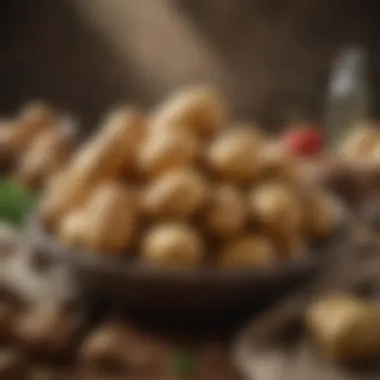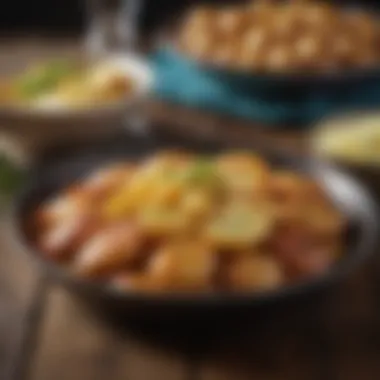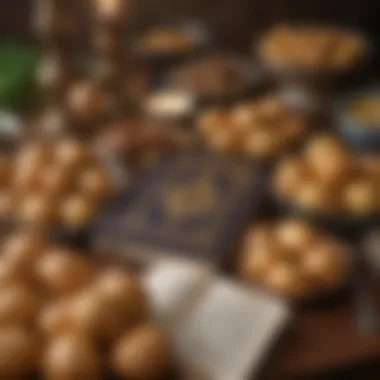Understanding Kosher Potatoes for Passover Meals


Intro
The kosher status of food items is central to the practice of Passover among the Jewish community. Potatoes, a staple vegetable, often find themselves under scrutiny during this time. Many individuals daily embrace potatoes as a versatile ingredient, prepared in numerous ways. However, when it comes to Passover, there are specific guidelines that many must consider, linking faith, tradition, and culinary practices.
This section aims to clarify potatoes' kosher status within the context of Passover. By understanding the parameters surrounding this vegetable, readers can make informed decisions about their dietary choices during the holiday. Preparing meals for Passover is not merely about food; it incorporates a tapestry of customs and beliefs that influence how dishes are prepared and enjoyed. As such, we will delve deeply into ingredients to enhance your knowledge and essential practices in creating kosher meals.
Ingredients Breakdown
In understanding how potatoes fit within the kosher laws during Passover, it is crucial to examine the ingredients utilized and kitchen tools required to prepare these meals. This section will lay the groundwork for your culinary journey.
Primary Ingredients
Potatoes are highly esteemed for their adaptability. During Passover, specific types of potatoes are often used:
- Yukon Gold: Favored for their rich flavor and balance of waxy and starchy texture.
- Russet Potatoes: Commonly used due to their high starch content, which creates fluffy textures in baked or mashed versions.
Each variety may be selected based on preference and intended culinary usage.
Optional Ingredients
Aside from potatoes, garnishing and flavoring ingredients can significantly elevate the dish. Though not required, ingredients like
- Fresh herbs (like parsley or dill)
- Garlic
- Onion
- Olive oil can enhance flavors without violating dietary laws.
These ingredients may help deliver delightful numbers of flavor while still maintaining the kosher requirements.
Essential Kitchen Tools
Proper tools can facilitate smooth and efficient cooking processes. Key items for preparing potato-based dishes include:
- A sharp knife for peeling and dicing potatoes
- A large pot or steamer
- A potato masher or ricer for creating smooth textures
- A cutting board for efficient prep
Having these tools on hand fosters a pleasant and organized cooking experience during Passover preparations.
Step-by-Step Preparation
Arming oneself with quality ingredients and tools enables a seamless potato cooking experience. Here, we will outline the essential steps involved in preparing these culinary delights while observing kosher practices.
Prepping the Ingredients
Preparation is vital. Before any cooking begins, wash the potatoes thoroughly under running water. Remove any eyes or blemishes and then peel if necessary. Uniformly cutting the potatoes can ensure even cooking. Preparation sets the stage for flavorful outcomes while remaining respectful of dietary laws.
Cooking Techniques and Methods
Several cooking methods are appropriate for potatoes during Passover:
- Boiling: Ideal for mashed potatoes or soups.
- Baking: Creates a crispy skin and fluffy interior, especially popular with Russet varieties.
- Roasting: A technique that brings out the sweetness and depth of flavor.
Each method boasts its merits, providing versatility for different palate preferences.
Assembly and Presentation Tips
Aesthetic presentation plays a significant role in festive meals. When serving potatoes, consider garnishing with fresh herbs or a sprinkle of colorful spices. You might choose elegant serving platters, emphasizing the heartiness and warmth of potato dishes. Cutting structures wisely adds visual interest on the table, ensuring appealing meal sharing during Passover.
Dietary Considerations
During Passover, dining often shifts to align with specific dietary laws. Understanding these can help create responsively inclusive meals.
Gluten-Free Options
Potatoes themselves are naturally gluten-free, making them an excellent alternative for those who are sensitive or intolerant to gluten. Well-rounded Polyn vegan meals that include potatoes may satisfy a variety of those requirements while keeping the traditional Passover spirit alive.
Vegetarian and Vegan Substitutes
Potatoes can seamlessly integrate into many vegetarian and vegan recipes. Substituting traditional components with potato varieties enriches Nutritions of dishes without compromise.
Nutrition Facts & Nutritional Considerations
Potatoes are a nutritious source of vitamins and minerals, primarily vitamin C and potassium. Eating them in moderation can help maintain a healthy diet while reducing excess calorie consumption during festive days.
Variations and Customizations


Creativity in cooking allows for personal expressions. Numerous variations and customizations can apply to potato dishes during the Passover holiday as described here:
Flavor Enhancements
Complementing potatoes with unique seasonings and fusions enhances their natural taste. Try infusing spices like cumin or paprika for a nuanced depth. Adjust easily to suit accepted family recipes or new experimental elements.
Alternative Cooking Methods
Exploring newer cooking methods such as air frying has gathered attention and remains exciting. This technique reduces fat levels for crisp results while maintaining potato essential flavors and textures.
Pairing Suggestions (Sides, Drinks, etc.
)
Pairing suitable side dishes or beverages can complete the meal. Blood orange juice or beet salads may serve your consolidation very pleasantly with potato-based foods.
Common Common Questionss and Troubleshooting
Frequently Asked Questions
- Are all potatoes kosher for Passover?
- Can I re-use leftover potatoes from a previous meal?
- Generally, yes. Potatoes do not naturally rise leavened bread and are typically safe to eat.
- Reusing properly stored potatoes may be acceptable, but ensure thorough cleaning and checking for any discoloration or odor before use.
Common Mistakes to Avoid
Some individuals may fail to consider kashrut when handling products. Ensure all ingredients meet kosher preparations, preventing unwanted surprises.
Solutions to Potential Problems
When culinary mishaps occur, remain calm. If too much salt is added, balance flavors with dairy or vegetable cleansing ingredients such as lemon juice. Clear troubleshooting investment today can result in satisfying culinary practices support during ritual meals.
Embracing the cooking truth: Dinner during Passover inspires a blend of tradition and creativity, especially with each bite symbolizing a pool of history and memory.
By understanding the principles and practices, individuals cultivat an engaged connection with culinary heritage, enhancing not just meals but relationships within communities during special times.
Preface to Passover and Dietary Laws
Passover, or Pesach, is a significant Jewish holiday that commemorates the liberation of the Israelites from slavery in ancient Egypt. The observances associated with this holiday extend far beyond being a mere historical remembrance; they shape daily life and dietary practices throughout the year for many Jewish families. This section sets the stage for an understanding of how Passover influences food choices and the kosher guidelines that govern these decisions.
Historical Context of Passover
Passover spans over 3,000 years of history. It traces its roots back to the biblical narrative in the Book of Exodus, where Moses leads the Israelites to freedom. The rituals practiced today originate from the unique paschal sacrifice that helped define the Israelite identity. During this festival, traditions such as matzah, unleavened bread, symbolize the hurried escape of the Israelites, while rituals related to forgiveness and joy mark their liberation. Understanding the historical context offers deeper insight into the passion surrounding its observance.
Defining Kosher: Rules and Regulations
The term 'kosher' refers to food that is fit for consumption according to Jewish law, known as kashrut. Kosher dietary laws prescribe various rules, including the types of food that may be eaten and the manner in which they are prepared. Some essential guidelines are as follows:
- Permitted and Forbidden Animals: Only certain species of animals are kosher. For instance, cows and sheep are allowed, while pig or rabbit is not.
- Separation of Meat and Dairy: Meat and dairy cannot be consumed together. Special tools and dishes are used for each to prevent cross-contamination.
- Inspection for Insects: All vegetables and fruits must be checked for insects, as insects are not kosher.
During Passover, these laws gain added complexity, especially with the focus on chometz, which refers to any leavened grain product. (Chometz comprises wheat, barley, rye, oats, and spelt.) The blending of historical context and current kosher laws enables a comprehensive understanding of dietary practices essential to Passover observance. Ultimately it reflects a blend of tradition, spirituality, and community that resonates with countless Jewish individuals today.
Understanding Chometz and Passover Restrictions
Understanding Chometz and Passover restrictions is critical in the context of Jewish dietary practices. Chometz refers specifically to grains that have fermented and leavened. This includes not just bread but also anything derived from wheat, barley, rye, oats, and spelt. The intention behind these restrictions is to commemorate the exodus from Egypt, where the Jews did not have time to let their bread rise.
What Constitutes Chometz?
Chometz is very specific. It includes any food that contains one of the five major grains and has come into contact with water for more than 18 minutes, allowing it to ferment. Examples of chometz are typical breads, pastries, and crackers. Additionally, certain processed food items may fall under this category if they contain any residual grain-based ingredients. Thus, it is vital for consumers to carefully read food labels during Passover.
Signs of Chometz to Avoid
- Bread: Any type of bread made from the five grains is chometz.
- Pastries and Confections: These often contain leavening agents.
- Certain Pasta: Unless specified as kosher for Passover, most pasta is off-limits.
Prohibitions Against Chometz During Passover
There are significant prohibitions against chometz during Passover observance. These rules apply not just to consumption, but also to ownership. During this time, Jews may not eat, possess, or derive any benefit from chometz. Hence, many prepare for Passover by removing all chometz from their homes, often leading to a thorough cleaning and organizing in the days leading up to the holiday.
The prohibitions serve to create a distinct environment during Passover. This shift invites observance of cultural traditions and enhances the spiritual experience of the holiday. Many people engage in symbolic food practices to replace chometz.


Final Thoughts on Chometz Restrictions
The understanding of chometz is not just a matter of avoidance; it involves deeper recognition of traditions and commitment to religious laws.
Chometz laws are viewed as not merely rules, but rather a vital component of identity and spiritual connection.
Every detail in the preparation and observance contributes to an overall rich cultural tapestry that defines the holiday. Awareness of what constitutes chometz, along with the prohibitions surrounding it, lays the groundwork for an informed Passover experience.
Potatoes: An Overview
Potatoes are a staple food in many cultures around the world. When considering Passover, their significance elevates particularly for Jewish households. They serve not only as a nutritious addition but also as a versatile ingredient able to adapt to various dishes suitable for the holiday. Understanding the role of potatoes during Passover helps clarify their kosher status and how they fit into the dietary landscape.
Potatoes provide several benefits:
- Nutritional Value: Potatoes offer a proper balance of carbohydrates, vitamins, and minerals. They are a good source of vitamin C and potassium, crucial for many bodily functions.
- Dietary Considerations: For many people, potatoes are gluten-free and can be an optimal choice for those who must avoid wheat. This is intertwined with the observance of chometz restrictions.
- Culinary Applications: The adaptability of potatoes makes them suitable for various preparations, aligning with different tastes during Passover.
With each of these aspects, potatoes emerge as a fundamental ingredient for festive meals. This wider picture sets the stage for understanding their specific nutritional and culinary properties. Certainly, this aligns closely with cultural significations of nurturing and comfort food prevalent during the holiday season.
Nutritional Profile of Potatoes
Potatoes possess several key nutritional characteristics beneficial for health. They are primarily composed of starch, but the nutritional profile extends with various vitamins and minerals. Here are crucial points:
- Calories: An average medium potato contains about 150 calories, making it a satisfying but not overly heavy choice.
- Carbohydrates: Approximately 37 grams per potato, providing the energy needed during Passover observance.
- Fiber: A medium potato demands around 4 grams of fiber, promoting healthy digestion.
- Vitamins and Minerals: Significant levels of potassium, aiding in nerve function and muscle control.
This rich composition makes potatoes an ideal option for Passover meals, especially in dishes seeking substance without chometz. By focusing on whole, unprocessed potatoes, dietary values remain intact across various culinary contexts.
Culinary Versatility of Potatoes
Potatoes shine brightly in the kitchen due to their flexibility in cooking methods. Different styles ranging from baking to boiling cater well to Jewish culinary traditions and contemporary palates. Let’s breakdown the various techniques:
- Baking: Roasted or baked potatoes can be enjoyed as is or incorporated into various recipes.
- Mashing: Creating smooth or chunky mashed potatoes can provide comfort during the sacred holiday.
- Frying: Fried dishes like potato latkes can resonate with tradition while also fitting modern tastes.
- Soups: Potato soup offers warmth and richness, epitomizing the soul of holiday cooking.
Essentially, potatoes can satisfy diverse tastes, playing a pivotal role in meals whether simple or elaborate. This unique versatility enhances their standing within Jewish culinary practice during Passover, ensuring varied options for all preferences.
Are Potatoes Considered Kosher for Passover?
In Jewish dietary law, the kosher status of any food item is crucial to how it is integrated into the observance of Passover. Understanding whether potatoes are kosher for Passover is significant for many who seek to maintain their dietary purity during this sacred time. Potatoes, due to their widespread consumption and ease of preparation, play a central role in many festive meals. However, ensuring they meet specific kosher guidelines is essential for adhering to tradition while enjoying these hearty tubers.
Rabbinical Opinions on Potatoes
Rabbinical perspectives on the kosher status of potatoes are generally favorable. Most prominent authorities in Jewish law confirm that potatoes do not qualify as chometz, which are leavened products banned during Passover. This agreement stems from potatoes being non-grain products. Major rabbinical opinions indicate that, since they are not derived from wheat, barley, oats, rye, or spelt, their use is permissible.
Here are some points synthesized from common rabbinical insights:
- Non-Grain Nature: Potatoes are classified botanically as tubers and originate from the nightshade family, contributing to their acceptance in Passover meals.
- Culinary Flexibility: Their adaptability for many recipes reinforces their role in the kitchen during Passover.
- Historical Context: Given that many Jewish communities around the world include potatoes in their traditional Seder plates and meals, there is a historical precedent supporting their kosher status.
A More Cautious Approach
Some authorities suggest careful scrutiny when consuming processed potato products to avoid hidden chometz ingredients. The common recommendation is to use fresh potatoes whenever possible and prepare them thoughtfully, ensuring that any additions conform to the kosher guidelines applicable during Passover.
Potatoes and the Chometz Guidelines
The guidelines regarding chometz are critical during Passover. Since chometz includes any food made from specific grains that have leavened, specialized attention must be given to the presence of any grain-derived flour that could inadvertently contact potatoes.
It is vital to keep in mind these aspects while implementing potatoes within Passover food customs:
- Food Processing: When engaging in culinary practices involving potatoes, purification of kitchen tools is paramount. They must be free of any traces of gluten-containing products.
- Checking for Matzah Meal: Should recipes call for matzah meal as a binding agent, substitutes or recommendations resulting from potatos themselves can be evaluated.
- Cross-Contamination: Cross-contact during preparation areas often poses risks. Use of separate utensils for Passover preparation is advisable, especially in kitchens where chometz may have been present.
Given these considerations, potatoes can comfortably fit within facilitating a kosher observance of Passover meals. Ideally, utilizing fresh or wisely prepared potato dishes retains tradition without compromising dietary restrictions.
Preparing Potatoes for Passover Observance
The topic of preparing potatoes for Passover observance holds significant importance within the context of Jewish dietary laws. Passover is a time when strict adherence to dietary regulations defines the observance of the holiday. The preparation of potatoes must not only consider their kosher status but also how they integrate into dishes that honor these traditions. For many, potatoes serve as a staple during Passover meals, offering versatility while remaining compliant with kosher principles. Ensuring a proper approach to cleaning and cooking can make all the difference in maintaining the essence of the holiday.
Best Practices for Cleaning and Cooking
Cleaning and cooking potatoes for Passover requires special attention to detail. Firstly, washing the potatoes thoroughly is essential. Potatoes are often grown in soil that may contain residue of non-kosher products. Thus, thoroughly rinsing them under running water eliminates potential contaminants. Remove any visibly bad spots or defects before proceeding.
After washing, it’s critical to dry the potatoes quickly also.
Using a separate knife for cutting them is wise, as it reduces the chance of contact with non-kosher items.


When preparing potatoes, some cooking methods are more favored than others during Passover. Boiling or baking without additional ingredients is recommended. Using utensils designated for Passover reinforces kosher compliance, as cross-contamination can lead to questions regarding kashrut.
"Pay special attention when it comes to the kosher status and methods used during Passover preparations; the essence of respect for tradition resides in these small details."
Recommended Cooking Techniques
Several cooking techniques work well for potatoes during Passover, with most fulfilling both kosher requirements and flavor preferences. The most common options include:
- Boiling
- Baking
- Roasting
- Mashing
Boiling is simpler, where you ensure the additive of salt or other spice is kosher for Passover. Baking enhances the natural flavor without needing additional ingredients, truly keeping the spirit of the holiday. Roasting can create a delightful texture, particularly for dishes like roasted potato medleys that exclude flavorings that might contain chometz. Mashing, typically incorporating kosher-certified butter or oil, can produce a comfortable side dish complementing various main courses.
To complement these cooking practices, serve the potatoes with simple enhancements like parsley or a sprinkle of paprika; the key lies in their pure preparation, letting the potatoes shine within the meal.
Ultimately, aligning these practices with the regulations of Passover enriches not only the specific dietary requirements but elevates the entire observance experience, palpably integrating food into the heart of the tradition.
Alternative Ingredients and Substitutes
The exploration of alternative ingredients and substitutes is essential during Passover. This period demands careful consideration of food choices due to strict dietary laws. The approach to cooking can change significantly, requiring creativity and flexibility. Awareness of suitable alternatives and substitutes may enhance meal propriety and attendance goals for the holiday.
Other Vegetables for Passover Dishes
Potatoes can be a staple during Passover, but various vegetables can serve as excellent alternatives. When observing kosher laws and trying to mix up traditional dishes, it's helpful to consider vegetables that complement flavors and textures. Some excellent options find their way into recipes:
- Carrots: Versatile, they can be roasted, boiled, or mashed. Their sweet flavor balances well with savory ingredients.
- Sweet Potatoes: Offering a touch of sweetness, they can boost the nutritional content of meals.
- Zucchini: Easy to prepare, it can be sautéed, grilled, or baked into casseroles.
- Cauliflower: This can serve as a low-carb substitute for mashed potatoes, providing creamy textures without grain.
- Beets: Their earthy flavors and vibrant color can add elegance to your plate while being kosher for Passover.
These vegetables ensure that meals remain diverse and satisfy varying dietary preferences.
Considering Gluten-Free Options
As many observe Passover gluten-free, choosing suitable substitutes is vital. Potatoes inherently promote gluten-free meals, but other gluten-free ingredients widen options. When adjusting recipes for those needing gluten-free options:
- Quinoa or Rice: Both of these healthy options work well as side dishes, enriching the meal significantly.
- Gluten-Free Flour: Available in types like almond, coconut, or chickpea, replaces regular flour effectively in recipes.
- Legumes: Generally, lentils, beans, and chickpeas can stand in for grains, providing texture, protein, and adherence to dietary restrictions.
Combining potatoes with such ingredients not only caters to the gluten-sensitive individuals but also improves the variety of Passover dishes. Keeping track of gluten-free status will make it easier for families to comply with dietary requirements while sharing flavorful meals during Passover.
Remember, understanding the kosher status of ingredients during Passover is crucial for compliance with dietary laws while maximizing diversity and flavor in your meals.
Common Passover Recipes Featuring Potatoes
The incorporation of potatoes in Passover recipes holds notable significance. Not only do they offer versatility and flavor, but they also blend well with dietary guidelines essential for this holiday. Many recipes revolve around traditional ways to prepare to ensure they meet kosher requirements. This aids in reinforcing culture and heritage through communal meals.
Classic Potato Kugel
Classic Potato Kugel is a staple during Passover. This dish, a kind of casserole, provides both texture and essential ingredients. Made mainly from potatoes, onions, and eggs, Kugel offers a harmonized blend of flavors that enriches any festive meal. The baking creates a crispy exterior while keeping the inside moist and hearty.
Best practices dictate using fresh ingredients. Organic potatoes are recommended as they typically enhance the overall taste. Just ensure that the potatoes are thoroughly cleaned to remove any potential chometz residues. Kugel can serve as a savory side dish, complementing various mains.
Potato Latkes for Passover
Potato Latkes, often prepared during Chanukah, have adapted to take a significant presence on Passover tables as well. The beauty of latkes lies in their simplicity. Finely grated potatoes form the heart of these pancakes. Once mixed with eggs and some seasoning, that mixture is pan-fried to golden perfection.
A major element to regard is the oil used for frying. Many prefer to use oil such as canola or vegetable, which are kosher for Passover processing. Additionally, pairing latkes with applesauce creates a mixture of both sweet and savory, enhancing the eating experience.
Mashed Potatoes with Passover Ingredients
Mashed potatoes can easily soar during Passover by using carefully chosen ingreidents. To customize, using chicken stock enhances flavor without complicating dietary rules. Opting for plant-based alternatives ensures respect for varied dietary needs. A combination of butter or olive oil can also give a creamy finish.
It's vital to approach the potato preparation mindfully. Choose adds such as garlic or herbs to season while ensuring everything used aligns correctly with Passover rules.
Closure: The Role of Potatoes in Passover Observance
Potatoes hold a significant place in the traditions surrounding Passover. They serve both nutritional value and cultural importance during this time of observance. Their versatility and ability to adapt to various dishes and cooking methods contribute to their status as an essential ingredient. As such, understanding how to appropriately include potatoes in Passover meals can enhance the dietary practices of many families.
Final Thoughts on Dietary Practices
The emphasis on dietary laws during Passover extends to everyday eating habits, which stresses adaptation and careful consideration of ingredients. While potatoes are generally considered kosher for Passover, awareness remains crucial, both in terms of preparation and consumption. This awareness positions potatoes as more than just a staple vegetable; it highlights the necessity of due diligence when adhering to Jewish dietary laws. Keeping kosher during Passover reflects the broader commitment to dietary practices shaped by religious traditions.
Encouraging Awareness of Food Choices
Promoting mindfulness regarding food choices especially in the context of Passover can not only uphold the sanctity of the observance but also yield enjoyable culinary experiences. Engaging with the depths of kosher laws around potatoes engenders a greater respect for the ingredients we use and the meals we prepare.
Encouraging a thoughtful selection of ingredients may lead to richer traditions and sustenance during Passover. Better choices in food contribute to greater spiritual health, cultivating an environment where both enjoyment and observance can exist harmoniously.
This process is as much about spiritual mindfulness as it is about gastronomic satisfaction.
Understanding these aspects fosters a deeper connection between faith, culture, and our relationship with food. Altogether, the role of potatoes in Passover is emblematic of broader dietary dialogues, reminding us to navigate our choices judiciously.







